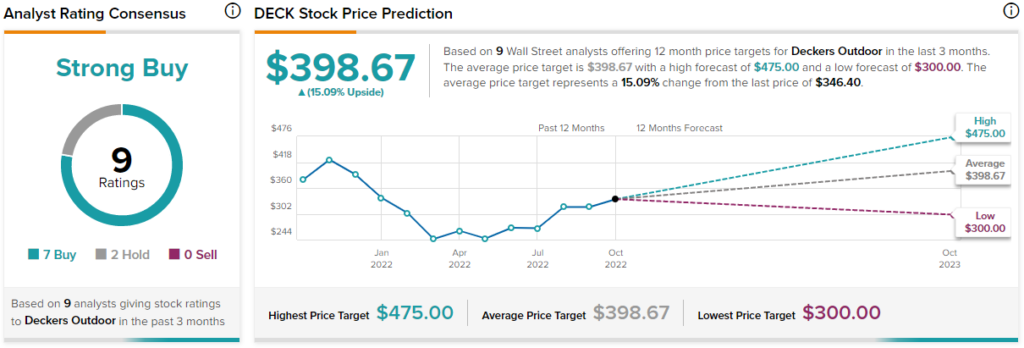Clothing and shoe store and distributor Deckers Outdoor (NYSE: DECK) saw shares slide overnight. The company, best known for its Ugg boot line, fell about 6% at one point today but has since recovered some of those losses. The biggest reason for the slump came from the company’s earnings report. It posted earnings of $3.80 per share, which readily beat TipRanks estimates calling for $3.70 per share. However, what really weighed on the company was a full-year forecast that the company reaffirmed.
Pick the best stocks and maximize your portfolio:
- Discover top-rated stocks from highly ranked analysts with Analyst Top Stocks!
- Easily identify outperforming stocks and invest smarter with Top Smart Score Stocks
Deckers Outdoor looked for sales between $3.45 billion and $3.5 billion. Consensus figures looked for Deckers to post sales of $3.51 billion, and that disappointment prompted selling.
I’m bullish on Deckers Outdoor. That’s thanks in large part to the fact that it’s selling a vital product—hard to go without shoes—which should help insulate it somewhat from a slumping macroeconomic picture.
Though certainly, it will absorb some losses thanks to hesitant consumers and a broad range of competitors in the field, it should still have a decent showing thanks to its own range of brands.
Is DECK a Good Stock to Buy?
Turning to Wall Street, Deckers Outdoor has a Strong Buy consensus rating. That’s based on seven Buys and two Holds assigned in the past three months. The average Deckers Outdoor price target of $398.67 implies 15.1% upside potential. Analyst price targets range from a low of $300 per share to a high of $475 per share.

Also, Deckers has a Smart Score of 9 out of 10 on TipRanks. That’s the second-highest score the scale can offer. It represents a strong likelihood that the company will do better than the broader market.
Other metrics, meanwhile, are proving quiet. Insider trading has been brisk but uninformative. Meanwhile, hedge funds reduced their shares of Deckers Outdoor in the last quarter, but only by 6,400 shares.

Looking at its financials, revenue and earnings have been rising historically, though its profit margin is declining a bit. Between 2021 and 2022, both revenue and earnings were up. Revenue went from $2.55 billion to $3.15 billion, and earnings went from $382.57 million to $451.95 million. Its profit margin, however, declined slightly from 15.03% in 2021 to 14.35% in 2022. Therefore, its profit margin decline is something to keep an eye on.
Putting All Your Eggs in Several Baskets
The good news for Deckers Outdoor is that it’s selling something that most people need every time they set foot outside of their homes: shoes. Granted, its shoes are a bit more upscale than the ordinary, from the popular Ugg boot line to the up-and-coming Hoka running shoe line.
However, that may actually help the company, going forward. Statistically, upscale buyers are the most resistant to an economic downturn. That won’t be the case forever, but the upscale buyer is usually the last to fold.
Additionally, while Ugg is arguably Deckers Outdoor’s flagship brand right now, Hoka is rapidly gaining. Currently, Hoka is the second-highest-ranked brand in “specialty running.” Some even suggest that, by 2025, Hoka could account for half of all of Deckers’ sales – not bad for a brand Deckers has only owned since 2013.
Deckers is also pulling in brand-new support from analysts. It was already pretty positive, and Stifel Financial just threw in a new data point this morning. Stifel maintained its Buy recommendation and upped its price target from $367 to $390.
Conclusion: Defying a Dangerous Landscape
In a way, Deckers Outdoor is almost like a set of shoes for your portfolio. The company is set up in such a way as to protect itself from harm in uncertain footing.
The company has a range of brands to offer. These brands are catching on with high-end shoppers, which helps ensure a stable market in an unstable macroeconomic setting.
While the buy-in price is substantial, up around $340 per share, it’s still closer to its lowest targets than it is to its average or even its highest. That represents significant potential for future gains.
Granted, retail will take a hit in the market, going forward. With hesitant consumers pulling in their wallets, the chance of realizing the most in sales is limited at best. However, Deckers has a way of working around that, and that kind of flexibility makes it attractive. That’s why I’m bullish on Deckers, a company that stands a better chance than most of surviving the downturn.



















